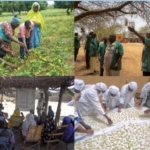


FUMA Gaskiya
University of Maradi, National Institute of Agricultural Research in Niger (INRAN), Mooriben, NGO Rail
Burkina Faso
5/2016—5/2019
Food insecurity in Niger is due to shortage of arable land (a vast amount of Niger is desert), high population growth, climate variability/ change, and low productivity due to poor soil fertility. Since fertilizers are often not affordable to farmers, especially to women, solutions need to be developed on how to best use locally existing resources. In the first phase of the project entitled “Improving family welfare through diversifying production on women’s fields in Niger,” technology options available at the farm level (soil fertilization with urine, wood ash or compost, partial weeding) and adapted crops and varieties were investigated to improve soil fertility and to diversify production. These options were tested under different contexts (two regions, three soil types, and women of different age and social status). Results were promising with urine fertilization and partial weeding gaining popularity among farmers. This, the second phase of the project will validate and deepen the results from the first phase and to improve the team’s capacity in management and interpretation of data sets obtained from a large number of on-farm trials. Women’s fields will remain a focus of the project. A typology of FUMA Gaskiya farmers will be developed. To serve future projects, the farmer typology will also include male farmers. Soil fertilization using local resources and alternative cultivar/crop options will be tested individually and in combination by different women farmer types in large-N trials, to identify intensification options for different contexts. Farmer-friendly data management and communication tools will be developed in cooperation with University of Maradi. The project will be implemented at two sites in Niger in cooperation with partners from the National Institute of Agricultural Research in Niger (INRAN), University of Maradi (different departments), the farmer organization Mooriben, the NGO Rail (social science) and the CCRP Research Methods group (David Stern).
Building on the first phase of the project, the purpose of this request is to use locally available resources and agricultural systems diversification options to increase productivity of fields managed by women farmers in two target regions of Niger. Further goals are to strengthen the capacity of the farmer federation FUMA Gaskiya to contribute to agricultural research and development in more meaningful ways; and to assess and refine the Farmer Research Network (FRN) approach, thereby putting the farmers into the center of the assessment. The second phase of this project led by FUMA Gaskiya deepens CCRPs experience with farmer-led research projects and contributes to CCRP’s strategy by focusing on women and locally available intensification options, and by identifying systems diversification options that can contribute productivity increases, income generation and diverse, nutritious diets. Hereby, the explicit work with women can also be an excellent entry point to improve family nutrition.
Suggested outputs and the related outcomes of this project are in the area of a farmer typology, data management system, validated, contextualized options for agricultural systems diversification and intensification with a specific focus on the contexts of women fields, and farmer-friendly communication tools.
